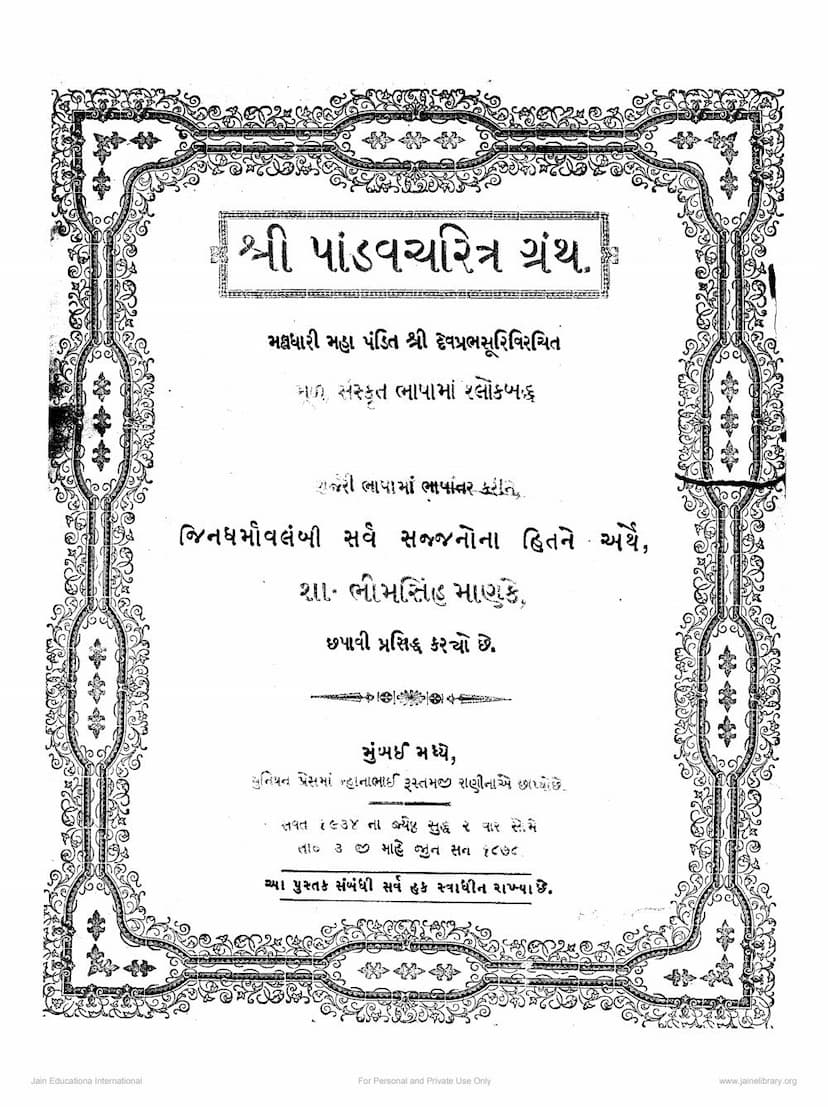Pandav Charitra Granth
Added to library: September 2, 2025

Summary
This comprehensive summary is based on the provided Gujarati text from the "Pandav Charitra Granth" by Shravak Bhimsinh Manek. The text, originally authored in Sanskrit by Maladhari Mahapandit Shri Devaprabhasuri, has been translated into Gujarati. The Granth details the lives and deeds of the Pandavas, incorporating a Jain perspective.
Here's a breakdown of the key aspects covered in the text:
1. Authorship and Publication:
- Book Title: શ્રી પાંડવચરિત્ર ગ્રંથ (Shri Pandav Charitra Granth)
- Original Author: મલધારી મહા પંડિત શ્રી દેવપ્રભસૂરિ (Maladhari Mahapandit Shri Devaprabhasuri)
- Translator & Publisher: શા. ભીમસિંહ માણકે (Shravak Bhimsinh Manek)
- Publication Date: The text indicates it was published in June 1878.
- Publisher's Location: Mumbai.
2. Purpose and Dedication: The Granth is published for the benefit of all householder devotees (Jinvallambi sarva sajjanono hita ne arth) who are followers of Jainism. The translator, Bhimsinh Manek, dedicates this Gujarati translation to Seth Keshavji Nayak and his son Seth Narsinhbhai Karavji, acknowledging their support and enthusiasm for the Gujarati translation.
3. Content Overview: The Pandav Charitra Granth is a significant Jain text that narrates the epic journey and lives of the Pandavas, interwoven with Jain principles and philosophy. The text meticulously describes:
- Mangalacharan (Invocation): The text begins with a salutation to the four Tirthankaras (Rishabhdev, Neminath, Parshvanath, and Mahavir) in Sanskrit, highlighting their divine qualities and the auspiciousness of their teachings.
- Genealogy and Early Life: It traces the lineage of the Pandavas, starting from Lord Rishabhdev, and details the birth and early lives of key figures like Krishna, Nemi, Yudhisthir, Duryodhana, and others. The narrative focuses on the virtues and accomplishments of these characters.
- Key Life Events: The Granth covers significant events from the Pandava saga, including:
- The Swayamvar of Draupadi.
- Arjun's pilgrimage.
- The Lakshagriha incident (house of lac).
- Bhima's victory over Bakasura.
- Battles like Kiratarjuniya and the slaying of various demons.
- The efforts of Duryodhana to thwart the Pandavas.
- The Pandavas' stay in Virat Nagar and the cow-seizing incident.
- The diplomatic mission of Sanjaya and Krishna.
- The great Kurukshetra War.
- The demise of Bhishma Pitahmah.
- The slaying of Jarasandha.
- The final journey and salvation (Nirvana) of Balarama, Lord Neminath, and the Pandavas.
- Narrative Style and Literary Merit: The text emphasizes the literary excellence of the original Sanskrit work, highlighting its poetic structure, intricate wordplay, profound meaning, and the skillful use of literary devices like similes and metaphors. The translator also praises the author, Devaprabhsuri, for his deep knowledge and mastery of scripture and rhetoric.
- Ethical and Spiritual Teachings: Embedded within the narrative are Jain ethical teachings, focusing on principles of detachment (vairagya), righteousness (niti), truthfulness (satya-pratigna), and the pursuit of spiritual liberation (moksha). The Granth is presented as a source of practical and spiritual wisdom, enlightening the reader and guiding them towards the righteous path.
- Praise for Sponsors: The translator expresses gratitude to Seth Keshavji and Seth Narsinhbhai for their contribution, wishing them long life and prosperity.
4. Structure of the Granth (Chapter Outline): The text provides a detailed chapter-wise summary (Anukramanika) of the Granth, outlining the content of each of the 18 chapters (Sarga). This includes descriptions of ancestors, the births of Krishna and Nemi, the establishment of Dwarka, the lives of various heroes and kings, major battles, and the ultimate spiritual journeys of the characters.
5. Jain Context: The Granth clearly presents the narrative from a Jain perspective. It emphasizes the virtuous qualities of the characters, their adherence to Jain principles, and their ultimate pursuit of liberation. The lives of the characters are framed within the context of karma and rebirth, highlighting the Jain concept of spiritual progress across lifetimes.
In essence, the Pandav Charitra Granth is a Jain retelling of the Mahabharata epic, focusing on the lives of the Pandavas and other prominent characters through the lens of Jain teachings. It serves as a moral and spiritual guide, celebrating virtue, detachment, and the path to liberation.